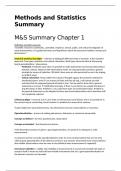Summary
Summary Quantitative Methods and Statistics Ch. 1 t/m 12 excl. 9 (Boek Hugo Quené) - Methods and Statistics (TW3V24001)
- Course
- Institution
This is a complete summary of chapters 1 through 12 (excluding chapter 9) based on the book Quantitative Methods and Statistics, written by Hugo Quené. This is the book used for the course Methods and Statistics at Utrecht University. The summaries include all concepts, explanations, and examp...
[Show more]



